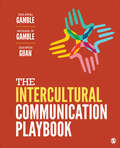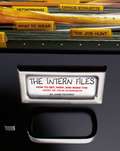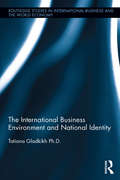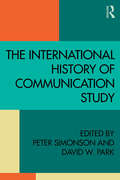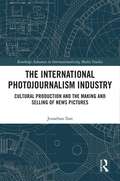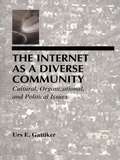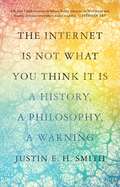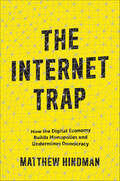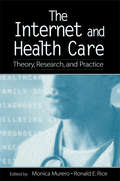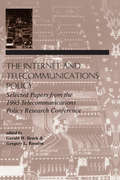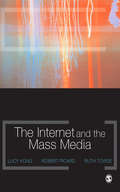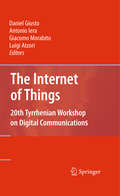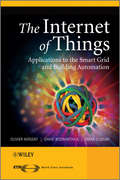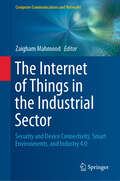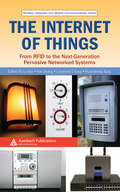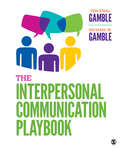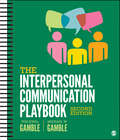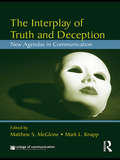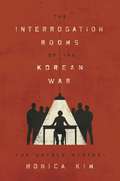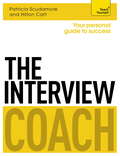- Table View
- List View
The Intercultural Communication Playbook
by Teri Kwal Gamble Michael W. Gamble Xiaowen GuanFeaturing a three-prong approach on culture, communication, and creative problem solving, The Intercultural Communication Playbook, with its unique, user-friendly layout and presentation, highlights how active, imaginative, and productive problem-solving methods can transform the way students understand intercultural communication. This framework from authors Teri Kwal Gamble, Michael W. Gamble, and Xiaowen Guan guides learners to understand their intercultural identity, broaden their worldview, and successfully improve their communication in real-world settings. Each chapter features exercises that encourage students to diversify their everyday thinking, individually examine their personal preferences, eliminate mental barriers, and discover innovative solutions to intercultural communication challenges.
The Intern Files
by Jamie Fedorko Dwight AllottIn today's highly competitive job market, an internship at the right company can be the first step to building a career. But how do you get the gig of your dreams? And once in the door, how do you figure out what to wear, whether it's okay to hook up with a coworker, and how to suck it up when you're smarter than your boss?
The International Business Environment and National Identity (Routledge Studies in International Business and the World Economy)
by Tatiana GladkikhGlobalisation influences every aspect of post-modern social reality. However, little empirical research has considered how globalisation affects people’s perception of their national attachments. This book explores the nature of national identity in our increasingly globalised society. "Who Are You?" is the question that it addressed in conversations with international business travellers whose exposure to different cultures, languages and values through their business travel and interactions with their foreign colleagues brings a new slant on their vision of the world. How does it influence their understanding of themselves? The International Business Environment and National Identity is based on interviews with Russian and British business travellers whose views on their national identity and the role of global business in shaping it offer a new insight on our understanding of the impact of global forces on contemporary society. The book discusses the respondents’ practical experiences of their international encounters, their impact on shaping their personal identification and highlights differences and similarities in people’s articulation of their national belonging. The issues of understanding the self and the effects of globalisation on business people’s professional and personal lives are at the core of the book’s investigation. The International Business Environment and National Identity will appeal to students and researchers of international management and cross cultural management as well as those studying intercultural communication and globalisation.
The International Distribution of News
by Jonathan Silberstein-LoebBased on newly available and extensive archival evidence, this book traces the history of international news agencies and associations around the world from 1848 to 1947. Jonathan Silberstein-Loeb argues that newspaper publishers formed news associations and patronized news agencies to cut the costs of news collection and exclude competitors from gaining access to the news. In this way, cooperation facilitated the distribution of news. The extent to which state regulation permitted cooperation, or prohibited exclusivity, determined the benefit newspaper publishers derived from these organizations. This book revises our understanding of the operation and organization of the Associated Press, the BBC, the Press Association, Reuters, and the United Press. It also sheds light on the history of competition policy respecting the press, intellectual property, and the regulation of telecommunications.
The International History of Communication Study
by Peter Simonson David W. ParkThe International History of Communication Study maps the growth of media and communication studies around the world. Drawing out transnational flows of ideas, institutions, publications, and people, it offers the most comprehensive picture to date of the global history of communication research and education. This volume reaches into national and regional areas that have not received much attention in the scholarship until now, including Asia, Latin America, Africa, and the Middle East alongside Europe and North America. It also covers communication study outside of academic settings: in international organizations like UNESCO, and among commercial and civic groups. It moves beyond the traditional canon to cover work by forgotten figures, including women scholars in the field and those outside of the United States and Europe, and it situates them all within the broader geopolitical, institutional, and intellectual landscapes that have shaped communication study globally. Intended for scholars and graduate students in communication, media studies, and journalism, this volume pushes the history of communication study in new directions by taking an aggressively international and comparative perspective on the historiography of the field. Methodologically and conceptually, the volume breaks new ground in bringing comparative, transnational, and global frames to bear, and puts under the spotlight what has heretofore only lingered in the penumbra of the history of communication study.
The International Photojournalism Industry: Cultural Production and the Making and Selling of News Pictures (Routledge Advances in Internationalizing Media Studies)
by Jonathan IlanHow are events turned into news pictures that define them for the audience? How do events become commodified into pictures that both capture them and reiterate the values of the agencies that sell them? This book looks at every stage of the production of news photographs as they move to and from the ground and are sold around the world. Based on extensive fieldwork at a leading international news agency that includes participant observation with photographers in the field, at the agency’s local and global picture desks in Israel, Singapore, and the UK, in-depth interviews with pictures professionals, and observations and in-depth interviews at The Guardian’s picture desk in London, the findings in this book point to a wide cultural production infrastructure hidden from – and yet also nurtured and thus very much determined by – the consumer’s eye.
The Internet As A Diverse Community: Cultural, Organizational, and Political Issues (LEA Telecommunications Series)
by Urs E. GattikerIn this volume, author Urs Gattiker offers a broad overview of Internet and technology-related theory. He examines Internet and multimedia issues from an international perspective, outlining issues of international sovereignty and the potential impact of national interests on global technology policy. He also surveys the issues of regulation and institutionalization of the Internet, examines ways for reducing the inequality of benefits from such technology, and explores the opportunities and challenges the Internet offers for consumers, firms, governments, and interest groups. In assembling this treatise, Gattiker synthesizes a vast body of literature from communication, economics, philosophy, political science, management, psychology, science policy, telecommunication engineering, and other areas. The Internet as a Diverse Community provides readers with a framework for analyzing and selecting between many different Internet choices. It explores issues from a social-impact perspective, using examples from a variety of contexts and firms around the world. The work also offers a wealth of new social theory on such topics as moral and ethical issues and the opportunities, choices, and challenges the Internet offers for consumers, investors, managers, and public policy decision makers. It examines the current and future challenges that computer-mediated technologies present, and sets forth new theoretical perspectives on such areas as multimedia and the profit-maximizing firm; the Internet and the private user; managing multimedia productively; and the social and moral costs of various Internet options and choices. Taken as a whole, this resource provides valuable insights on the Internet and is essential reading for business, telecommunication, public policy, and technology decision makers around the globe.
The Internet Is Not What You Think It Is: A History, a Philosophy, a Warning
by Justin E. SmithAn original deep history of the internet that tells the story of the centuries-old utopian dreams behind it—and explains why they have died todayMany think of the internet as an unprecedented and overwhelmingly positive achievement of modern human technology. But is it? In The Internet Is Not What You Think It Is, Justin Smith offers an original deep history of the internet, from the ancient to the modern world—uncovering its surprising origins in nature and centuries-old dreams of radically improving human life by outsourcing thinking to machines and communicating across vast distances. Yet, despite the internet’s continuing potential, Smith argues, the utopian hopes behind it have finally died today, killed by the harsh realities of social media, the global information economy, and the attention-destroying nature of networked technology.Ranging over centuries of the history and philosophy of science and technology, Smith shows how the “internet” has been with us much longer than we usually think. He draws fascinating connections between internet user experience, artificial intelligence, the invention of the printing press, communication between trees, and the origins of computing in the machine-driven looms of the silk industry. At the same time, he reveals how the internet’s organic structure and development root it in the natural world in unexpected ways that challenge efforts to draw an easy line between technology and nature.Combining the sweep of intellectual history with the incisiveness of philosophy, The Internet Is Not What You Think It Is cuts through our daily digital lives to give a clear-sighted picture of what the internet is, where it came from, and where it might be taking us in the coming decades.
The Internet Trap: How the Digital Economy Builds Monopolies and Undermines Democracy
by Matthew HindmanA book that challenges everything you thought you knew about the online economyThe internet was supposed to fragment audiences and make media monopolies impossible. Instead, behemoths like Google and Facebook now dominate the time we spend online—and grab all the profits from the attention economy. The Internet Trap explains how this happened. This provocative and timely book sheds light on the stunning rise of the digital giants and the online struggles of nearly everyone else—and reveals what small players can do to survive in a game that is rigged against them.Matthew Hindman shows how seemingly tiny advantages in attracting users can snowball over time. The internet has not reduced the cost of reaching audiences—it has merely shifted who pays and how. Challenging some of the most enduring myths of digital life, Hindman explains why the internet is not the postindustrial technology that has been sold to the public, how it has become mathematically impossible for grad students in a garage to beat Google, and why net neutrality alone is no guarantee of an open internet. He also explains why the challenges for local digital news outlets and other small players are worse than they appear and demonstrates what it really takes to grow a digital audience and stay alive in today’s online economy.The Internet Trap shows why, even on the internet, there is still no such thing as a free audience.
The Internet and Health Care: Theory, Research, and Practice (Routledge Communication Series)
by Ronald E. Rice Monica MureroThe Internet and Health Care: Theory, Research, and Practice presents an in-depth introduction to the field of health care and the Internet, from international and interdisciplinary perspectives. It combines expertise in the areas of the social sciences, medicine, policy, and systems analysis. With an international collection of contributors, it provides a current examination of key issues and research projects in the area. Methods and data used in the chapters include personal interviews, focus groups, observations, regional and national surveys, online transcript analysis, and much more. Sections in the book cover:*e-Health trends and theory; *searching, discussing, and evaluating online health information at the individual level of analysis; *discussing health information at the group or community level; and *implementing health information systems at the regional and social level. The Internet and Health Care will prove useful for university educators and students in the social, public health, and medical disciplines, including Internet researchers. It is also oriented to professionals in many disciplines who will appreciate an integrative theoretical, empirical, and critical analysis of the subject matter, including developers and providers of online health information.
The Internet and Telecommunications Policy: Selected Papers From the 1995 Telecommunications Policy Research Conference (Lea Telecommunications Ser.)
by Gerald W. Brock, Gregory L. RosstonThis book is based on the Telecommunications Policy Research Conference which reports on research into telecommunications policy issues. While the conference is now a respectable 23 years old, this is only the second printed edition of selected papers. A new law, the Telecommunications Act of 1996, accelerated the process of integration in the communication industry and made major revisions to the Communications Act of 1934 that increase the incentive for integration within the industry. Although the papers in this volume were written prior to the passage of the new law, their importance is merely enhanced by it. They deal with fundamental, complex policy problems that arise when previously separate segments of the telecommunications industry are integrated, rather than specific regulatory rules that are likely to be changed under the new law. With the passage of this law, the timeframe for developing appropriate policies for an integrated industry has been shortened. Changes expected to occur over a period of several years will now likely occur much more rapidly. These papers provide insights to help guide the transition in the industry. Divided into five parts, this volume: * deals with problems of transforming local exchange telephone service from a monopoly in each geographical area to an interconnected competitive network of networks, * considers the pricing problems that arise in an integrated network carrying traffic of different types across multiple service providers, * examines the problem of achieving interoperability in complex networks, * considers issues of intellectual property that arise in expected integrated networks of the future, and * discusses electronic publication of scholarly journals, copyright protection, and the applicability of copyright law in the digital age.
The Internet and the Mass Media
by Ruth Towse Robert G. Picard Lucy Keung"This book analyses issues of the internet and mass media in a rapidly changing environment. It covers a wide range of fundamentals which will be in effect for a longer time, and reflects the benefits of international and interdisciplinary collaboration." - Heinz-Werner Nienstedt, President, European Media Management Education Association "This excellent book will be of great use to researchers, teachers and students interested in the relationship between the Internet and the mass media and it offers an invaluable contribution to the literature. The overall picture that emerges from this book is one that is very balanced, stressing both the radical potential of the internet and the ways in which the various media sectors have experienced the impact differently." - Colin Sparks, University of Westminster What impact has the Internet really had on the media industries? What new regulatory policies and business models are driven by the Internet? And what are the effects of the Internet on how we produce, access and consume music, film, television and other media content? After an initial flurry of analysis and prediction of the future of the dot com boom, this is the first book to review the developments of the first Internet era and investigate its actual outcomes. Bringing together sophisticated analyses from leading scholars in the field, The Internet and the Mass Media explores the far-reaching implications of the Internet from economic, regulatory, strategic and organizational perspectives. This cross-disciplinary, international view is essential for a rich, nuanced understanding of the many technological, economic, and social changes the Internet has brought to the way we live and work.
The Internet of Things
by Luigi Atzori Antonio Iera Giacomo Morabito Daniel GiustoThis book presents a selection of papers submitted to the 20th Tyrrhenian Workshop, which took place in September 2009 in Sardinia, Italy. The workshop focused on the "Internet of Things." This subject is quickly emerging in the wireless technology arena. It describes the pervasive presence of a variety of devices--such as sensors, actuators, and mobile phones--which, through unique addressing schemes, are able to interact and cooperate with each other to reach common goals. This novel paradigm, which originated from the idea of "smart" environments, will be sure to impact the future of logistics, Intelligent Transportation Systems, business and process management, assisted living, E-health, and other applications. The Internet of Things covers a wide array of essential topics related to this emerging paradigm, including infrastructures and applications, communication systems and network architectures, embedded systems, and location and tracking through navigation sensors. It also addresses the technological and social implications of this technology, as well as challenges that may arise.
The Internet of Things
by Olivier Hersent Omar Elloumi David BoswarthickAn all-in-one reference to the major Home Area Networking, Building Automation and AMI protocols, including 802.15.4 over radio or PLC, 6LowPAN/RPL, ZigBee 1.0 and Smart Energy 2.0, Zwave, LON, BACNet, KNX, ModBus, mBus, C.12 and DLMS/COSEM, and the new ETSI M2M system level standard. In-depth coverage of Smart-grid and EV charging use cases.This book describes the Home Area Networking, Building Automation and AMI protocols and their evolution towards open protocols based on IP such as 6LowPAN and ETSI M2M. The authors discuss the approach taken by service providers to interconnect the protocols and solve the challenge of massive scalability of machine-to-machine communication for mission-critical applications, based on the next generation machine-to-machine ETSI M2M architecture. The authors demonstrate, using the example of the smartgrid use case, how the next generation utilities, by interconnecting and activating our physical environment, will be able to deliver more energy (notably for electric vehicles) with less impact on our natural resources.Key Features:Offers a comprehensive overview of major existing M2M and AMI protocols Covers the system aspects of large scale M2M and smart grid applications Focuses on system level architecture, interworking, and nationwide use casesExplores recent emerging technologies: 6LowPAN, ZigBee SE 2.0 and ETSI M2M, and for existing technologies covers recent developments related to interworkingRelates ZigBee to the issue of smartgrid, in the more general context of carrier grade M2M applications Illustrates the benefits of the smartgrid concept based on real examples, including business casesThis book will be a valuable guide for project managers working on smartgrid, M2M, telecommunications and utility projects, system engineers and developers, networking companies, and home automation companies. It will also be of use to senior academic researchers, students, and policy makers and regulators.
The Internet of Things in the Industrial Sector: Security and Device Connectivity, Smart Environments, and Industry 4.0 (Computer Communications and Networks)
by Zaigham MahmoodThis book has a focus on the development and deployment of the Industrial Internet of Things (IIoT) paradigm, discussing frameworks, methodologies, benefits and limitations, as well as providing case studies of employing the IoT vision in the industrial domain. IIoT is becoming an attractive business reality for many organisations such as manufacturing, logistics, oil and gas, energy and other utilities, mining, aviation, and many more. The opportunities for this paradigm are huge, and according to one report, the IIoT market is predicted to reach $125 billion by 2021. The driving philosophy behind the IIoT is that smart machines are better than humans at accurately capturing, analysing and communicating real-time data. The underlying technologies include distributed computing, machine learning, artificial intelligence, and machine-to-machine communication, with a typical IIoT system consisting of intelligent systems (applications, controllers, sensors, and security mechanisms), data communication infrastructure (cloud computing, edge computing, etc.), data analytics (to support business intelligence and corporate decision making), and most importantly the human element. The promised benefits of the IIoT include enhanced safety, better reliability, smart metering, inventory management, equipment tracking, and facilities management. There are, however, numerous issues that are also becoming the focus of active research, such as concerns regarding service availability, data security, and device communication. Lack of ubiquitous interoperability between heterogeneous devices is also a major concern. This book intends to fill a gap in the IIoT literature by providing the scientific contributions and latest developments from researchers and practitioners of international repute, focusing on frameworks, methodologies, benefits, and inherent issues/barriers to connected environments, especially in industrial settings.The intended audience includes network specialists, hardware engineers, and security experts who wish to adopt newer approaches for device connectivity, IoT security, and sensor-based devices design. University level students, researchers and practitioners will also find the latest innovation in technology and newer approaches relevant to the IIoT from a distributed computing perspective.
The Internet of Things: From RFID to the Next-Generation Pervasive Networked Systems (Wireless Networks And Mobile Communications Ser. #12405)
by Laurence T. Yang Yan Zhang Huansheng Ning Lu YanUbiquitous and pervasive technologies such as RFID and smart computing promise a world of networked and interconnected devices. Everything from tires to toothbrushes could soon be in communications range, heralding the dawn of an era in which today's Internet of People gives way to tomorrow's Internet of Things- where billions of obje
The Interpersonal Communication Book, 14th Edition
by Joseph A. DeVito<P>The book approaches the subject of communication through integrative theory, research, and hands-on methods.<P> A threefold approach identifies important communicative concepts: choices in interpersonal situations, the theories and research that support these choices, and the communication skills necessary to effectively use these theories. <P>The text allows readers to examine the question of how, when, and through which channels they should communicate in different contexts.<P> The Fourteenth Edition provides the newest insights and research in person-to-person interaction, making for an up-to-date source for communication study.<P> New features and chapter-by-chapter updates make Interpersonal Communication the most comprehensive, relevant source on the topic.
The Interpersonal Communication Playbook
by Teri Kwal Gamble Michael W. GamblePractical skills for developing successful relationships—both face-to-face and online Written in a conversational style and presented in an innovative handbook format, The Interpersonal Communication Playbook empowers you to take an active role in the development of your communication skills. Best-selling authors Teri Kwal Gamble and Michael Gamble provide you with abundant opportunities to make personal observations, analyze personal experiences, and assess personal growth across interpersonal contexts. Offering an array of communication settings for you to practice your skills, this text makes it easy for you to see how relevant theory can be applied to develop and maintain healthy relationships with family, friends, romantic partners, and coworkers. Key Features Insightful, relatable examples and real-world scenarios engage you and encourage you to critically reflect on your own communication dynamics. “Learning objectives at the beginning of each chapter outline key objectives and help you master important concepts and prepare for exams. Opening vignettes introduce the relevance of chapter content through a contemporary example of communication in action, exemplifying chapter themes with engaging and relevant stories. “What Do You Know?” features promotes self-assessment of knowledge and encourages you to address any misconceptions you discover. “Try This” boxes promote active learning and provide you with opportunities to put your skills into practice. “Reflect On This” boxes connect theory with practice—bringing key concepts and ideas to life. “Analyze This” boxes encourage you to apply critical thinking to examples of interpersonal encounters from literature and popular culture. “Connect the Case” features includes chapter-ending cases designed to help you assess interpersonal communication outcomes to help solidify and further develop the skills learned.
The Interpersonal Communication Playbook
by Teri Kwal Gamble Michael W. GamblePractical skills for developing successful relationships—both face-to-face and online Written in a conversational style and presented in an innovative handbook format, The Interpersonal Communication Playbook empowers you to take an active role in the development of your communication skills. Best-selling authors Teri Kwal Gamble and Michael Gamble provide you with abundant opportunities to make personal observations, analyze personal experiences, and assess personal growth across interpersonal contexts. Offering an array of communication settings for you to practice your skills, this text makes it easy for you to see how relevant theory can be applied to develop and maintain healthy relationships with family, friends, romantic partners, and coworkers. Key Features Insightful, relatable examples and real-world scenarios engage you and encourage you to critically reflect on your own communication dynamics. “Learning objectives at the beginning of each chapter outline key objectives and help you master important concepts and prepare for exams. Opening vignettes introduce the relevance of chapter content through a contemporary example of communication in action, exemplifying chapter themes with engaging and relevant stories. “What Do You Know?” features promotes self-assessment of knowledge and encourages you to address any misconceptions you discover. “Try This” boxes promote active learning and provide you with opportunities to put your skills into practice. “Reflect On This” boxes connect theory with practice—bringing key concepts and ideas to life. “Analyze This” boxes encourage you to apply critical thinking to examples of interpersonal encounters from literature and popular culture. “Connect the Case” features includes chapter-ending cases designed to help you assess interpersonal communication outcomes to help solidify and further develop the skills learned.
The Interpersonal Communication Playbook
by Teri Kwal Gamble Michael W. GambleWritten in a conversational style and presented in an innovative handbook format, The Interpersonal Communication Playbook empowers students to take an active role in the development of their communication skills in both physical and digital arenas. Bestselling authors Teri Kwal Gamble and Michael W. Gamble provide students with ample opportunities to make personal observations, examine personal experiences, and assess their personal growth across interpersonal contexts. The Second Edition features a new chapter on The Cultural Dynamics of Interpersonal Communication in response to the COVID-19 pandemic and lessons learned on adapting communication skills to changing conditions, ways to develop communication resiliency, and the value in practicing mindfulness. This title is accompanied by a complete teaching and learning package. Contact your SAGE representative to request a demo. Learning Platform / Courseware SAGE Vantage is an intuitive learning platform that integrates quality SAGE textbook content with assignable multimedia activities and auto-graded assessments to drive student engagement and ensure accountability. Unparalleled in its ease of use and built for dynamic teaching and learning, Vantage offers customizable LMS integration and best-in-class support. It’s a learning platform you, and your students, will actually love. Learn more. Assignable Video with Assessment Assignable video (available in SAGE Vantage) is tied to learning objectives and curated exclusively for this text to bring concepts to life. Watch a sample video now. LMS Cartridge: Import this title’s instructor resources into your school’s learning management system (LMS) and save time. Don’t use an LMS? You can still access all of the same online resources for this title via the password-protected Instructor Resource Site. Learn more.
The Interpersonal Communication Playbook
by Teri Kwal Gamble Michael W. GambleWritten in a conversational style and presented in an innovative handbook format, The Interpersonal Communication Playbook empowers students to take an active role in the development of their communication skills in both physical and digital arenas. Bestselling authors Teri Kwal Gamble and Michael W. Gamble provide students with ample opportunities to make personal observations, examine personal experiences, and assess their personal growth across interpersonal contexts. The Second Edition features a new chapter on The Cultural Dynamics of Interpersonal Communication in response to the COVID-19 pandemic and lessons learned on adapting communication skills to changing conditions, ways to develop communication resiliency, and the value in practicing mindfulness. This title is accompanied by a complete teaching and learning package. Contact your SAGE representative to request a demo. Learning Platform / Courseware SAGE Vantage is an intuitive learning platform that integrates quality SAGE textbook content with assignable multimedia activities and auto-graded assessments to drive student engagement and ensure accountability. Unparalleled in its ease of use and built for dynamic teaching and learning, Vantage offers customizable LMS integration and best-in-class support. It’s a learning platform you, and your students, will actually love. Learn more. Assignable Video with Assessment Assignable video (available in SAGE Vantage) is tied to learning objectives and curated exclusively for this text to bring concepts to life. Watch a sample video now. LMS Cartridge: Import this title’s instructor resources into your school’s learning management system (LMS) and save time. Don’t use an LMS? You can still access all of the same online resources for this title via the password-protected Instructor Resource Site. Learn more.
The Interplay of Truth and Deception: New Agendas in Theory and Research (New Agendas in Communication Series)
by Mark L. Knapp Matthew S. McGloneDuring the past 30 years, there have been a steadily increasing number of scientific and popular publications dealing with lying and deception. Questions about the extent to which public officials are deceptive are standard fare in current magazines and newspapers. This volume aims to present on a more precise conceptualization of this phenomenon, manifested in some well-known constructions like spin, hype, doublespeak, equivocation, and contextomy (quoting out of context). The contents of the volume have been generated for the New Agendas symposium at the University of Texas College of Communication, and all the authors are young, leading-edge researchers offering innovative perspectives and explorations of lying and deception in various contexts. This volume will appeal to scholars, researchers, and advanced/graduate students in communication, media, and psychology. It is written to the level of advanced undergraduates, and it is appropriate for use in courses covering lying and deception.
The Interrogation Rooms of the Korean War: The Untold History
by Monica KimA groundbreaking look at how the interrogation rooms of the Korean War set the stage for a new kind of battle—not over land but over human subjectsTraditional histories of the Korean War have long focused on violations of the thirty-eighth parallel, the line drawn by American and Soviet officials in 1945 dividing the Korean peninsula. But The Interrogation Rooms of the Korean War presents an entirely new narrative, shifting the perspective from the boundaries of the battlefield to inside the interrogation room. Upending conventional notions of what we think of as geographies of military conflict, Monica Kim demonstrates how the Korean War evolved from a fight over territory to one over human interiority and the individual human subject, forging the template for the US wars of intervention that would predominate during the latter half of the twentieth century and beyond.Kim looks at how, during the armistice negotiations, the United States and their allies proposed a new kind of interrogation room: one in which POWs could exercise their “free will” and choose which country they would go to after the ceasefire. The global controversy that erupted exposed how interrogation rooms had become a flashpoint for the struggles between the ambitions of empire and the demands for decolonization, as the aim of interrogation was to produce subjects who attested to a nation’s right to govern. The complex web of interrogators and prisoners—Japanese-American interrogators, Indian military personnel, Korean POWs and interrogators, and American POWs—that Kim uncovers contradicts the simple story in US popular memory of “brainwashing” during the Korean War.Bringing together a vast range of sources that track two generations of people moving between three continents, The Interrogation Rooms of the Korean War delves into an essential yet overlooked aspect of modern warfare in the twentieth century.
The Intersection of 6G, AI/Machine Learning, and Embedded Systems: Pioneering Intelligent Wireless Technologies
by Ashutosh Sharma Shruti Sharma Trinh Van ChienThis comprehensive guide to the emerging areas and synergistic relationships among the domains of 6G, machine learning, and embedded systems offers readers a detailed analysis of their converging paths and contributions to the development of intelligent wireless systems. Readers will gain a solid understanding of the principles and technologies behind 6G, machine learning, and embedded systems. They will learn how these three areas intertwine and why this intersection is pivotal for the next generation of wireless technologies.The contributors to this volume present a thorough and detailed analysis of this technology, highlighting its promising features, underlying technologies, and potential applications. The book first explores various applications of machine learning algorithms in areas such as network optimization, resource allocation, interference management, and intelligent data processing and analysis. Design considerations and challenges are presented, and case studies of innovative applications, such as smart cities, autonomous vehicles, healthcare, and industrial automation, are examined. The book concludes with a discussion of future trends and opportunities in this rapidly evolving field. Readers will benefit from the theoretical foundations and practical insights presented within and will be prepared to address future challenges and opportunities in these three fields.This book is a valuable resource for academic researchers and industry professionals working in the fields of wireless communication, machine learning, embedded systems, and artificial intelligence.
The Interview Coach: Teach Yourself
by Pat Scudamore Hilton CattBy the end of this book you will be fully prepared to give an outstanding interview .- Identify your strengths and weaknesses- Understand what interviewers are looking for- Practice your answers to typical questions- Build your confidence to tackle any situation- Get the job you wantOther books help you talk the talk. The Teach Yourself Coach books helps you walk the walk.Who are you? * Anyone with an interview coming upWhere this book take you?* You will be fully prepared to give an outstanding interviewHow does it work?* A combination of practical tried-and-tested advice, and unique interactive exercisesWhen can you do it?* In your own time, at your own paceWhat else do you get?* Access to free online videos and printable resourcesWhy Teach Yourself®?* Teach Yourself books are trusted around the world and have helped sixty million people achieve their goals
